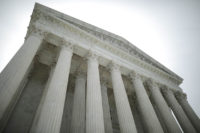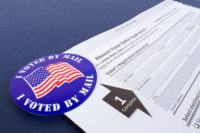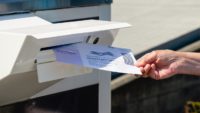Vote Fraud
Vote fraud disenfranchises Americans and poses a serious threat to both the integrity of and confidence in our electoral system. Opponents of measures to prevent vote fraud contend that its occurrence is either nonexistent or so rare as to be insignificant.
Vote fraud is insidious, committed quietly. And once it’s committed, it cannot be undone. Vote fraud contaminates the pool of votes, and if sufficiently extensive, will affect the outcome of an election. As elections determine who exercises political power, there is a motivation among some bad actors to cheat.
Vote fraud is rarely prosecuted for two main reasons. First, it is virtually impossible to identify the fraud before the damage is done as it is primarily committed through absentee and mail-in balloting; second, prosecuting the crime is expensive and is usually a low priority of prosecutors and local law enforcement more concerned with public safety. However, vote fraud is a crime that strikes at the center of our republic.
The principal weakness in our electoral system that fosters vote fraud is inaccurate voter registration rolls. The federal requirement that counties maintain clean, accurate voter rolls has been ignored over the years and actively resisted under the Obama Department of Justice.
Voter rolls should contain only the names of eligible residents of a jurisdiction, but in far too many counties, voter rolls bulge with the names of the dead, those who have moved away, non-citizens, fictional names and voters registered in more than one place.
A Pew Center on the States study in 2012 revealed that:
- Approximately 24 million—one of every eight—voter registrations in the United States were no longer valid or were significantly inaccurate.
- More than 1.8 million deceased individuals were listed as voters.
- Approximately 2.75 million people had registrations in more than one state.
In nearly 200 counties around the nation, more people are registered to vote than the counties’ population of eligible citizens. Examples abound of non-citizens and convicted felons registered to vote. In Philadelphia, an ACRU lawsuit in 2016 revealed thousands of ineligible people on the voter rolls. A sampling of counties in Virginia also found hundreds of illegal registrations, according to a 2016 study by the Public Interest Legal Foundation.
In-person vote fraud, while far more rare than absentee voting, does happen, as shown by the video sting operations of Project Veritas, in which an impersonator at a polling place in the District of Columbia claimed to be then-Attorney General Eric H. Holder, Jr. and easily obtained a ballot. In other Project Veritas videos political operatives openly discussed how to commit vote fraud in Wisconsin and other states.
The institutional Left has focused on preventing common-sense laws to require voters to prove they are who they claim they are, making the ridiculous and unprovable claim that photo ID laws discriminate against racial minorities and the poor. But, vote fraud is accommodated by other means such as extended voting periods and relaxed standards for acquiring absentee or mail-in ballots and not requiring proof of citizenship when registering to vote.
Several reasonable actions should be adopted to guard against vote fraud:
- enforce federal voter roll maintenance laws;
- require photo ID to vote in person;
- require voter ID and signature verification for absentee ballots;
- limit early voting to no more than a week prior to an election;
- require proof of U.S. citizenship;
- encourage more states to participate in cooperative efforts to identify voters registered in more than one state.
Voting is a privilege of citizenship and only legal votes should be counted. The only way to stop vote fraud is to prevent it!
ACRU Commentary
One of These is not Like the Other
There is a critical difference between an absentee ballot and the new notion of universal vote by mail. One is proven and safe, the other is subject to incompetent processing and open to fraud. Voters and elected officials must understand the enormous difference in order to protect the security our elections.
Dead cats voting: funny, not funny
Former Atlanta feline Cody Tims passed away in 2008 after a lifetime of service to his loving family. This cat apparently was signed on to a mailing list at one point that was then sold to vote activists (yet another mail-only voting problem.) Cody is a purrfect example of why voting lists need constant updating. It is appalling that this cat not only was a registered voter but is still a registered voter after having passed away twelve years ago.
Inaccurate voter registration is an incubator for fraud
The difference between absentee voting and mail-only voting is that absentee voting requires a request for a ballot, but mail-only voting means a ballot will be sent to a house where a voter once lived. This article provides a great primer on why this is an invitation for fraud, and also uses Honest Elections Project data to show how widespread voter registration inaccuracies truly are.
SCOTUS says “no” to relaxing vote security laws
Alabama has long standing curbside voting rules and identification requirements for absentee ballots that safeguard the votes of its citizens. A group led by the Southern Poverty Law Center demanded these protections be overturned (Covid--the usual excuse) and an Obama appointed state judge agreed. Fortunately, the Supreme Court did not, and Alabama will be able to continue to ensure the integrity of its votes.
ACRU’s Blackwell: Nursing home vote fraud happens, and is preventable
ACRU Action Board Member Ken Blackwell fearlessly takes on “all the fraud we cannot see” (and the fraud we can) in senior residences. Vote suppression and manipulation in these facilities is real, and a reason why ACRU created Protect Elderly Votes. Warning of union activism, and asking residence executives for help, Ken notes that the votes of our Greatest Generation are a target for fraudsters and we must protect them.
ACRU’s Blackwell: Nursing home vote fraud happens, and is preventable
ACRU Action Board Member Ken Blackwell fearlessly takes on “all the fraud we cannot see” (and the fraud we can) in senior residences. Vote suppression and manipulation in these facilities is real, and a reason why ACRU created Protect Elderly Votes. Warning of union activism, and asking residence executives for help, Ken notes that the votes of our Greatest Generation are a target for fraudsters and we must protect them.
News
ACRU’s Protect Elderly Votes’ concerns about nursing home fraud confirmed
In a state where ballot harvesting is illegal, a remarkable coincidence occurred right before election day. According to reports from the Senate Judiciary Committee, 25,000 nursing home residents in different facilities across the state all requested ballots at the same time. Who ordered them? And more importantly, who filled them out? An investigation is currently ongoing.
Nevada whisleblower affidavit alleges disregard of mail-in signature verification
An affidavit from a Nevada whistleblower alleges that election supervisors Clark County, which accounts for the vast majority of voters in the state, counted mail-in ballots despite concerns about whether signatures were valid. Source: Nevada [...]
Dead Voters Receiving Mail-In Ballots Across New Jersey Ahead of Election
Bring out your dead! The dead are now receiving mail-in election ballots in New Jersey, so are people who haven’t lived at an address in years, sometimes decades, if ever at all. One New Jersey Mayor, Carlos Rendo of Woodcliff Lake, who ran for Lt. Governor in 2017 today sounded the alarm.
Ballots stolen from mailboxes, discarded on roadsides in Washington town
Police in a city just east of Seattle said Friday that numerous mail ballots have been stolen from people's mailboxes and placed or discarded elsewhere. The post office alerted the Sammamish Police Department "that unopened or incomplete ballots have been inappropriately placed in out-going mail bins," the city of Sammamish said Friday.
Dallas man and his late wife’s stolen identity used to commit voter fraud
A Dallas man who says he had his voter identification stolen this year says he has voted in every election since Richard Nixon won in 1968, and each year he has waited to cast his ballot on Election Day. With such a hotly contested race in 2020, he wanted to make sure he got his vote in early. His message to everyone: he’s glad he did.
Possible mail-in voter fraud in DuPage County under investigation
DuPage County prosecutors are investigating three potential cases of voter fraud tied to mail-in ballots allegedly requested for people who are dead.









